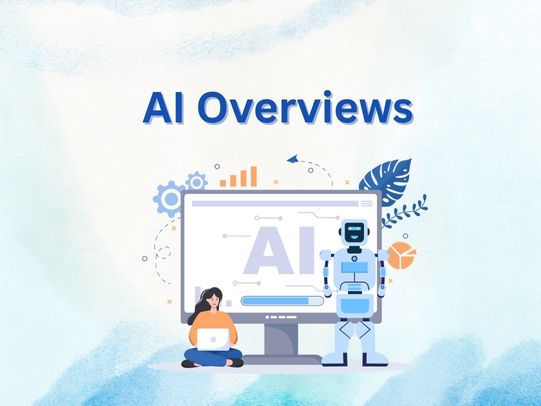Search is evolving faster than ever. In 2024, Google began rolling out a major change to how users interact with search results-AI Overviews (previously known as SGE, or Search Generative Experience). This update is reshaping what it means to rank on page one.
If you’re wondering:
- What are AI Overviews?
- How does it work?
- Will it steal your traffic?
- And what can you do about it?
You’re in the right place.
What Are ‘AI Overviews’?
AI Overviews is Google’s integration of generative AI into search results. It uses artificial intelligence to summarize answers to queries directly in the search results, reducing the need for users to click on multiple websites.
Example:
Search query: “Best mattress for back pain”
Traditional search: 10 blue links + ads + snippets
AI Overview search: An AI-generated summary recommending features, product types, and even listing brands-before showing traditional results.
How AI Overviews Works
AI Overviews appears at the top of SERPs (Search Engine Results Pages) and uses:
- Large Language Models (LLMs) like PaLM and Gemini
- Google’s index of websites for fact-checking
- Knowledge graphs to structure answers
- Citations from various websites (sometimes your blog, sometimes your competitor’s)
It delivers a condensed, “smart” answer, and depending on the query, it may include:
- Bullet points
- Embedded images
- Links to websites (but often fewer than traditional featured snippets)
Check here On-Page SEO Checklist
Why AI Overviews Matters
AI Overviews marks a major shift in search behavior. It changes:
- What gets seen first: Organic results are pushed further down.
- How users interact: Many will get their answers without ever clicking.
- Who gets traffic: Google may cite you-or may not-even if your content inspired the response.
Does AI Overviews Affect Organic Traffic?
Short answer: Yes. And it’s complicated.
Here’s how it impacts websites and marketers:
1. Reduced Clicks (Zero-Click Searches)
Many users get their answer directly in the AI Overview. That means fewer clicks to blogs, eCommerce stores, or even local service pages.
2. Visibility Is a Coin Toss
Even if you’re ranking #1, your content may be used in the AI Overview without a clear link. Or, a lesser-ranking site might be cited over yours.
3. Higher Quality Threshold
To be cited in AI Overviews, your content must be:
- Extremely relevant
- Well-structured
- Demonstrate E-E-A-T (Experience, Expertise, Authoritativeness, Trust)
4. Winners and Losers
According to early data:
- Health, Finance, and Tech blogs are among the hardest hit
- Forums, community-based answers (like Reddit or Quora) often get cited
- E-commerce sites may see fewer clicks on product comparisons
Learn here How to Do Keyword Research with AI Tools
Example: Mattress Blog Traffic Drop
Let’s say you run a mattress review site. Previously, when someone searched “best mattress for back pain,” your blog post ranked #1 and earned 15K clicks/month.
After AI Overviews:
- The AI box gives a summary with general info + 3 cited sites
- You are not cited
- Your traffic drops 35%
Even though your blog is still on page 1, fewer people scroll down or click through.
Check out 30 AI Tools That Will Save You 100+ Hours a Month
How to Optimize for AI Overviews
Don’t panic-adapt.
Here’s how to future-proof your content for AI-influenced search:
1. Demonstrate Experience (E-E-A-T)
Include:
- Author bios with credentials
- First-hand product use
- Original photos and videos
- Specific results from using a product/service
2. Target Search Intent Accurately
Avoid generic topics like “best SEO tool.” Instead go niche:
- “Best free SEO tools for solo bloggers in 2025”
- “How to use SEO tools to audit a cleaning services website”
3. Use Structured Data (Schema Markup)
Use FAQ, How-To, Review, and Article schema to help Google understand your content’s purpose.
4. Answer Questions Clearly and Early
- Use H2s and H3s with user queries
- Summarize answers in the first paragraph under each heading
5. Write in a Conversational, Human Tone
Google’s AI favors natural language-just like a human would ask or answer a question.
Bonus Strategy: “Be the Source”
Sometimes, AI Overviews cite niche sources or forums. Try to:
- Answer questions on Reddit and Quora with links to your blog
- Encourage user reviews and testimonials on your site
- Offer original research or mini case studies
FAQ: AI Overviews & SEO
Q1: Can I opt out of being included in AI Overviews?
No, not currently. But you can opt out of AI summaries like Google’s SGE labs via meta tags-though it limits exposure, not risk.
Q2: How do I know if I’m cited in an AI Overview?
Right now, there’s no reliable tool, but:
- Use Google Search Console’s Performance reports
- Monitor for drop in traffic + impressions
- Manually search your target keywords in incognito mode
Q3: Will traditional SEO still work?
Yes, but it’s evolving. The focus is shifting toward topic authority, brand trust, and helpfulness, not just keywords.
Q4: What type of content is safe from AI Overviews?
Original opinion, case studies, hyper-local services, and visual/video content are harder to summarize and often require clicks.
Conclusion: Where SEO Goes from Here
AI Overviews isn’t the death of SEO-it’s a turning point.
Google is now trying to become both the search engine and the answer. If your goal is to survive and thrive, focus on:
- Creating helpful, original content
- Becoming an authority in your niche
- Understanding what real people are searching for
Those who adapt will still win.
Final Tip: Watch, Learn, and Update
SEO is now a moving target. Make AI Overviews part of your monthly audit-just like Core Web Vitals or backlink checks.
The best SEOs don’t fear change-they optimize for it.


